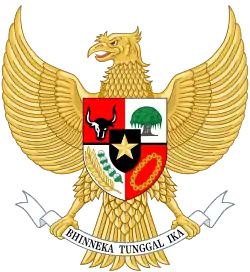Judiciary of Indonesia
The Judiciary of Indonesia comprises the Supreme Court of Indonesia and the Constitutional Court of Indonesia together with public courts, religious courts, administrative courts and military courts.
The Supreme Court
The Supreme Court is Indonesia's highest court. It is the final court of appeal for criminal and civil verdicts. It also resolves disputes between courts. It is led by the Chief Justice of the Supreme Court of Indonesia, currently Muhammad Syarifuddin.[1][2] There are two separate officeholders for the title of Deputy Chief Justice of the Supreme Court Indonesia: Sunarto for both judicial affairs (acting) and non-judicial affairs.
The Constitutional Court
The Constitutional Court rules over disputes concerning the Constitution of Indonesia as well as matters involving elections and political parties. The current Chief Justice of the Constitutional Court of Indonesia is Arief Hidayat, who replaced Hamdan Zoelva in 2015. Zoelva's predecessor, Akil Mochtar, was stripped of his powers following allegations of accepting bribes.[3][4] The current Deputy Chief Justice of the Constitutional Court of Indonesia is Anwar Usman.
Public courts
The public courts comprise the district courts at the first level and the high courts at the appellate level, after which any appeal goes to the Supreme Court. They can try criminal and civil cases involving Indonesian citizens or foreign citizens.
State courts have authority at the city and regency level, while high courts function at the provincial level.[5]
There are specialised courts formed within the system of public courts: juvenile courts, human rights courts, labour courts, commercial courts, fishery courts and anti-corruption courts.
Religious courts
Religious courts are for Muslim citizens to resolve matters such as marriage, inheritance and property donated for religious purposes.[6] Religious courts are located at the district/municipality (kabupaten/kota) level and there are 343 of these courts of first instance at the regency or city level across Indonesia, including 19 Syariah Courts in Aceh. At the appeal level, religious high courts now number 29, (as of 2010), including the recently renamed Mahkamah Syariat (Syariah Court) in Banda Aceh.[7] Since 2006, a number of districts have issued local ordinances based on Syariah, expanding the domain of religious courts.[8]
Administrative courts
Administrative courts were established in 1986 as a consequence of a law intended to ensure that people would not be treated arbitrarily by government officials or organisations. They rule in disputes involving the state officials or bodies, both at the centre and in the regions.[9]
There is one specialised court created within the system of the administrative courts – the Tax Court.
Military courts
These deal with cases involving members of the Armed Forces.[10] First-instance military courts (Dilmil) consider cases regarding military personnel whose ranks are not higher than a captain. High military courts (Dilmilti) consider appeals against decisions of the lower Dilmil courts and also act as first-instance courts in cases, involving military personnel with ranks of a major and above. The Primary Military Court (Dilmiltama) hears appeals against the decisions of Dilimilti courts and also decides upon issues of jurisdiction of the military courts.
Judges
Judges decide cases based on written law. If there is no applicable written law, Law No. 14/1970 states that judges must apply unwritten law and decide cases with wisdom and full responsibility to God.[11]
References
- Triyono, Agus (8 February 2012). "Hatta Ali Elected New Supreme Court Chief Justice". The Jakarta Globe.
- Bambang Waluyo (1992) pp. 98, 112-113
- "Chief Justice of Constitutional Court Detained by Anti-Corruption Authority". The Jakarta Globe. 3 October 2013.
- Denny Indrayana (2008), pp. 266-267
- Waluyo (1992), pp. 15-16, 34
- Bambang Waluyo (1992) p42
- Lindsey & Sumner. "Courting reform: Indonesia's Islamic Courts and Justice for the Poor" (PDF). Retrieved 30 August 2012.
- "Indonesia". Freedom in the World 2012. Freedom House. Retrieved 23 February 2013.
- Bambang Waluyo (1992) pp. 65, 68
- Bambang Waluyo (1992) p88
- Bambang Waluyo (1992) p11
Further reading
- Waluyo, Bambang (1992). Implementasi Kekuasaan Kehakiman Republik Indonesia [The Implementation of Judicial Power in the Republic of Indonesia] (in Indonesian). Jakarta: Sinar Grafika. ISBN 979-8061-42-X.
- Indrayana, Denny (2008). Indonesian Constitutional Reform 1999-2002: An Evaluation of Constitution-Making in Transition. Jakarta: Kompas Book Publishing. ISBN 978-979-709-394-5.
